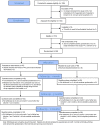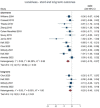Can we mitigate the psychological impacts of social isolation using behavioural activation? Long-term results of the UK BASIL urgent public health COVID-19 pilot randomised controlled trial and living systematic review
- PMID: 36223980
- PMCID: PMC9811092
- DOI: 10.1136/ebmental-2022-300530
Can we mitigate the psychological impacts of social isolation using behavioural activation? Long-term results of the UK BASIL urgent public health COVID-19 pilot randomised controlled trial and living systematic review
Abstract
Background: Behavioural and cognitive interventions remain credible approaches in addressing loneliness and depression. There was a need to rapidly generate and assimilate trial-based data during COVID-19.
Objectives: We undertook a parallel pilot RCT of behavioural activation (a brief behavioural intervention) for depression and loneliness (Behavioural Activation in Social Isolation, the BASIL-C19 trial ISRCTN94091479). We also assimilate these data in a living systematic review (PROSPERO CRD42021298788) of cognitive and/or behavioural interventions.
Methods: Participants (≥65 years) with long-term conditions were computer randomised to behavioural activation (n=47) versus care as usual (n=49). Primary outcome was PHQ-9. Secondary outcomes included loneliness (De Jong Scale). Data from the BASIL-C19 trial were included in a metanalysis of depression and loneliness.
Findings: The 12 months adjusted mean difference for PHQ-9 was -0.70 (95% CI -2.61 to 1.20) and for loneliness was -0.39 (95% CI -1.43 to 0.65).The BASIL-C19 living systematic review (12 trials) found short-term reductions in depression (standardised mean difference (SMD)=-0.31, 95% CI -0.51 to -0.11) and loneliness (SMD=-0.48, 95% CI -0.70 to -0.27). There were few long-term trials, but there was evidence of some benefit (loneliness SMD=-0.20, 95% CI -0.40 to -0.01; depression SMD=-0.20, 95% CI -0.47 to 0.07).
Discussion: We delivered a pilot trial of a behavioural intervention targeting loneliness and depression; achieving long-term follow-up. Living meta-analysis provides strong evidence of short-term benefit for loneliness and depression for cognitive and/or behavioural approaches. A fully powered BASIL trial is underway.
Clinical implications: Scalable behavioural and cognitive approaches should be considered as population-level strategies for depression and loneliness on the basis of a living systematic review.
Keywords: Adult psychiatry; Depression & mood disorders.
© Author(s) (or their employer(s)) 2022. Re-use permitted under CC BY. Published by BMJ.
Conflict of interest statement
Competing interests: We have read the journal’s policy and the authors of this manuscript have the following competing interests. DE and CCG were committee members for the NICE Depression Guideline (update) Development Group between 2015 and 2022, and SiG was a member between 2015 and 2018. SiG, PC and DM are supported by the NIHR Yorkshire and Humberside Applied Research Collaboration (ARC) and DE is supported by the North East and North Cumbria ARCs. CCG is part funded by West Midland ARC.
Figures



References
Publication types
MeSH terms
LinkOut - more resources
Full Text Sources
Medical
